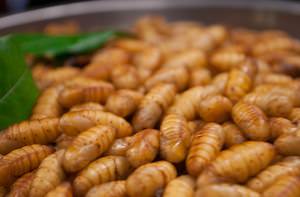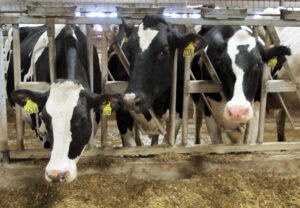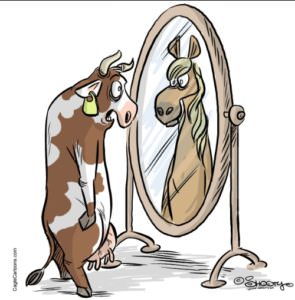Grab a Fork, Mealworm Time Is Approaching
Bad news, meat lovers and occasional carnivores. Insects could become the sustainable meat of the future if world leaders do nothing and global warming remakes the climate.
Bad news, meat lovers and occasional carnivores. Insects could become the sustainable meat of the future if world leaders do nothing and global warming remakes the climate.
In a study published Wednesday in the online journal PLOS ONE, Dennis Oonincx and Imke de Boer of the University of Wageningen in the Netherlands report that beetle larvae, otherwise known as mealworms, could be produced much more sustainably than today’s staple meats, as the insects use less land and less energy per unit of protein than required for conventional meats.
They also have a smaller carbon footprint. A 2010 study by the same scientists found that a pound of mealworms required just 1 percent of the amount of greenhouse gases needed to produce a pound of beef.
“Since the population of our planet keeps growing, and the amount of land on this earth is limited, a more efficient, and more sustainable system of food production is needed,” Oonincx said in a press statement. “Now, for the first time it has been shown that mealworms, and possibly other edible insects, can aid in achieving such a system.”
Unfortunately, mealworms turn out to be better for your health too. According to PBS, a pound of mealworms has more protein and half the fat of a pound of pork. Veganism is starting to look better and better.
— Posted by Alexander Reed Kelly.
Your support matters…Smithsonian.com:
This prospect might seem absurd—and, for some, revolting—but the problem of greenhouse gas emissions resulting from meat production is quite serious. The UN estimates that livestock production accounts for roughly 18% of all emissions worldwide, caused by everything from the fuel burned to grow and truck animal feed to the methane emitted by ruminants such as cows as they digest grass. Of most concern, since world populations are increasing and growing more wealthy, is that the demand for animal protein is expected to grow by 70-80% by 2050.
… The researchers came to this conclusion by conducting an environmental impact assessment for a commercial mealworm producer in the Netherlands (mealworms are often cultivated as a food for reptile and amphibian pets). They analyzed every input used in the process of rearing the worms, including the energy used to heat the incubators, the grain used as feed and the cardboard used for rearing cartons. Even including all these inputs, the worms were much more climate-friendly than conventional protein sources.
Sure, you might be pretty reluctant to sit down to a bowl of mealworm macaroni, but in a number of places around the world—especially in Asia—they’re considered a perfectly normal food. Even some people here in the U.S. agree: A quick search reveals mealworm recipes you can cook up at home, like mealworm french fries and stir-fried mealworms with egg, while Mosto, a trendy restaurant in San Francisco, serves crispy mealworms over ice cream.
Independent journalism is under threat and overshadowed by heavily funded mainstream media.
You can help level the playing field. Become a member.
Your tax-deductible contribution keeps us digging beneath the headlines to give you thought-provoking, investigative reporting and analysis that unearths what's really happening- without compromise.
Give today to support our courageous, independent journalists.




You need to be a supporter to comment.
There are currently no responses to this article.
Be the first to respond.